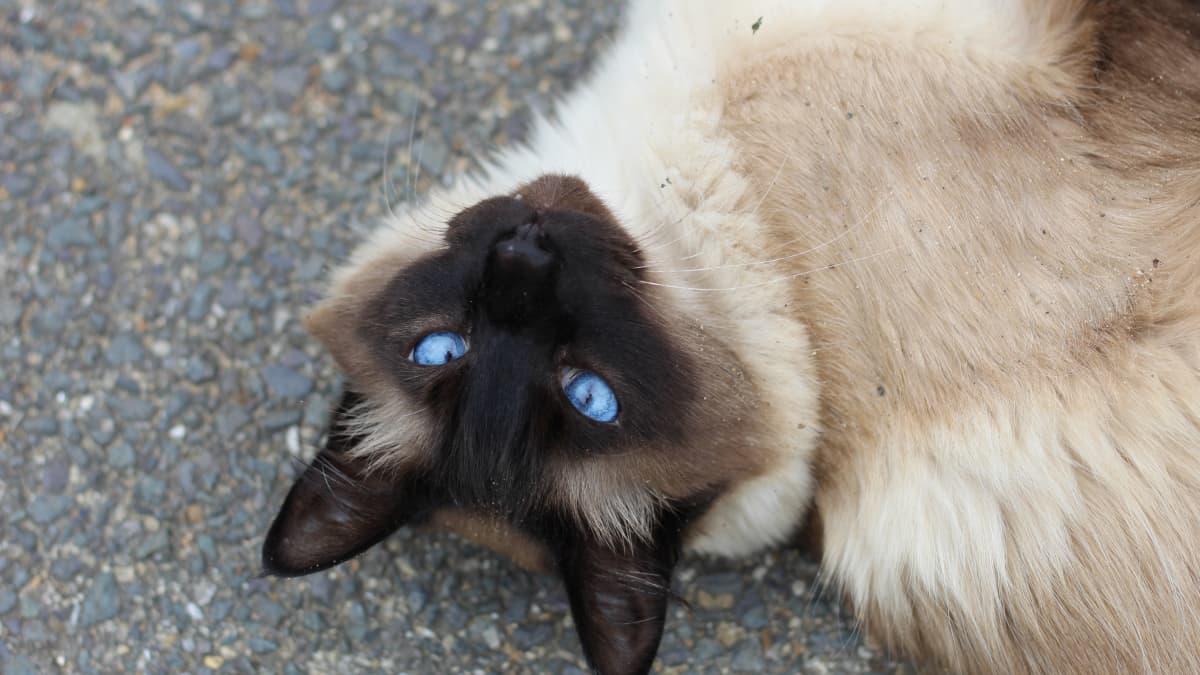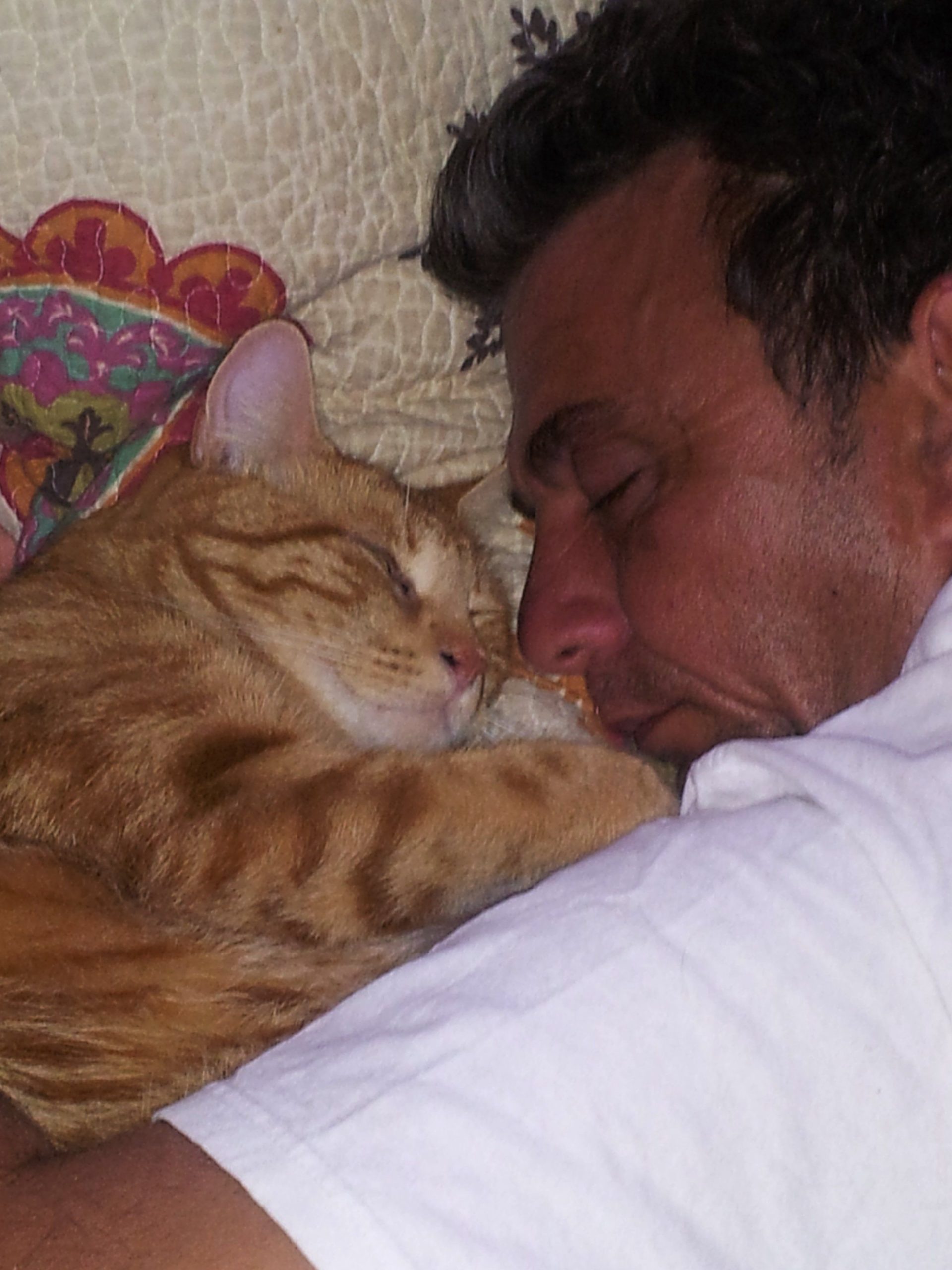Contents
- I. Introduction to Siamese Cats
- II. Characteristics of Siamese Cats
- III. Siamese Cat Behavior Patterns
- IV. Understanding the Calming Down Process
- V. Factors Affecting the Calming Down of Siamese Cats
- VI. Tips for Helping Siamese Cats Calm Down
- VII. Frequently Asked Questions about Siamese Cat Behavior
- 1. Do Siamese cats meow a lot?
- 2. Are Siamese cats affectionate?
- 3. Do Siamese cats get along well with other pets?
- 4. Are Siamese cats good with children?
- 5. Do Siamese cats require a lot of exercise?
- 6. Are Siamese cats prone to separation anxiety?
- 7. Do Siamese cats like water?
- 8. Are Siamese cats intelligent?
- 9. Do Siamese cats require a lot of grooming?
- 10. Are Siamese cats prone to any specific health issues?
I. Introduction to Siamese Cats

Siamese cats are known for their striking appearance and unique personality. With their sleek bodies, blue almond-shaped eyes, and distinctive color points, Siamese cats are easily recognizable and highly sought after as pets. But there is more to these feline companions than just their good looks.
Originating from Thailand, formerly known as Siam, Siamese cats have a rich history. They were once considered sacred and were only owned by royalty. It wasn’t until the late 19th century that Siamese cats were introduced to the western world. Since then, their popularity has grown tremendously.
A. Appearance
The first thing that captures attention is the Siamese cat’s color points. These cats have a light-colored body with darker shades on their ears, face, paws, and tail. The most common color points are seal, chocolate, blue, and lilac. The contrast between the body color and the points creates a stunning visual effect.
Siamese cats have a slim and muscular build, giving them an elegant and graceful appearance. Their coat is short and fine, requiring minimal grooming. They are also known for their striking blue almond-shaped eyes, which are expressive and full of curiosity.
B. Personality
Siamese cats are often described as extroverted and social. They enjoy being the center of attention and are known for their talkative nature. Siamese cats are quite vocal and will let you know how they feel through their wide range of vocalizations.
These cats thrive on companionship and love to be involved in their human family’s activities. They are intelligent and curious, always ready to explore their surroundings. Siamese cats are also known for their loyalty and affection towards their owners.
C. Maintenance
Siamese cats are relatively low-maintenance when it comes to grooming. Their short coat requires regular brushing to keep it looking sleek and to minimize shedding. Additionally, their ears should be checked regularly for cleanliness, and their teeth should be brushed to maintain good oral hygiene.
Regular playtime and mental stimulation are essential for the well-being of Siamese cats. They are active and agile, so providing them with interactive toys and scratching posts will help keep them entertained and prevent boredom.
II. Characteristics of Siamese Cats

## II. Characteristics of Siamese Cats
Siamese cats are known for their unique and distinctive characteristics. Here are some of the key traits that make them stand out among other cat breeds:
### 1. Elegant Appearance
Siamese cats have a sleek and elegant appearance. They have a slender body with long, graceful legs and a long, tapering tail. Their short, fine coat lies close to their body, emphasizing their athletic physique. The color of their coat is lighter on their body and darker on their extremities, such as their face, ears, paws, and tail.
### 2. Striking Blue Eyes
One of the most captivating features of Siamese cats is their mesmerizing blue eyes. Their eyes are almond-shaped and set at a slightly slanted angle, adding to their exotic and alluring look. The intensity of their blue eyes is due to a gene that causes a lack of pigmentation in the iris.
### 3. Vocal and Social Nature
Siamese cats are known for being extremely vocal and sociable. They are not afraid to express their opinions and will often engage in conversations with their owners. Their distinctive voice is loud and can range from soft purring to loud yowling. Siamese cats crave attention and enjoy being the center of attention, making them great companions for those who enjoy interactive pets.
### 4. Intelligent and Curious
Siamese cats are highly intelligent and have a curious nature. They love exploring their surroundings and are constantly on the lookout for new adventures. Siamese cats are known to be problem solvers and can quickly learn tricks and commands. They enjoy interactive toys and puzzles that challenge their mental abilities.
### 5. Affectionate and Loyal
Siamese cats form strong bonds with their owners and are known for their affectionate and loyal nature. They enjoy being close to their humans and will often follow them around the house. Siamese cats are also known to be sensitive to their owner’s moods and will provide comfort and support when needed.
In conclusion, Siamese cats possess a unique combination of elegance, striking blue eyes, vocal nature, intelligence, and affection. They make wonderful companions for those who appreciate their distinctive characteristics and are willing to provide them with the love and attention they crave.
III. Siamese Cat Behavior Patterns

Siamese cats are known for their unique and distinct behavior patterns. Understanding these patterns can help cat owners provide the best care and environment for their Siamese companions.
1. Vocalization
Siamese cats are famously talkative. They have a wide range of vocalizations and are not afraid to use them. From loud meows to chirps and even trills, Siamese cats love to communicate with their human companions. This chatty nature is one of the reasons why they are so popular among cat lovers.
2. Affectionate Nature
Siamese cats are known for being affectionate and social. They enjoy being around people and are often described as “lap cats.” Siamese cats crave attention and will often follow their owners around the house. They are highly intelligent and can easily bond with their human family members, forming strong and loving relationships.
3. Playfulness
Siamese cats have a playful and energetic nature. They love interactive toys and will happily engage in play sessions with their owners. Providing them with toys that stimulate their minds and challenge their agility is essential for keeping them entertained and happy. Regular playtime also helps prevent boredom and destructive behavior.
4. Curiosity
Siamese cats are naturally curious creatures. They love exploring their surroundings and investigating anything that catches their attention. This curiosity can sometimes get them into trouble, so it’s important to create a safe environment for them. Siamese cats enjoy having vertical spaces to climb, such as cat trees or shelves, which satisfy their instinctual need to explore and observe their surroundings from above.
5. Social Behavior
Siamese cats are highly social animals. They enjoy the company of other cats and even dogs if properly introduced. They thrive in households where they have feline or canine companionship. However, it’s crucial to ensure that the introductions are done slowly and properly to prevent any potential conflicts or stress.
Understanding the behavior patterns of Siamese cats is essential for providing them with a fulfilling and enriched life. By catering to their vocalization, affectionate nature, playfulness, curiosity, and social behavior, cat owners can ensure that their Siamese companions are happy and content.
IV. Understanding the Calming Down Process

When it comes to Siamese cats, understanding their calming down process can be essential for cat owners seeking a peaceful and harmonious home environment. Siamese cats are known for their energetic and playful nature, often described as hyperactive during their early months.
The Early Months: A Bundle of Energy
During the early months of a Siamese cat’s life, they are like little balls of energy, constantly on the move and looking for new adventures. Their curiosity knows no bounds, and they may find themselves exploring every nook and cranny of your home.
It’s important to provide them with plenty of toys and activities to keep them engaged and prevent them from becoming bored. Interactive toys, scratching posts, and climbing trees can help redirect their energy in a positive way.
Maturity Brings Calmness
As Siamese cats mature, they tend to mellow down and become more relaxed. Their hyperactive behavior gradually subsides, and they learn to appreciate moments of tranquility. This calming down process usually occurs between one and three years of age.
During this stage, it’s crucial to maintain a stable and comfortable environment for your Siamese cat. Ensuring they have a designated area where they can retreat and relax is essential. Providing cozy beds, quiet spaces, and a calming atmosphere can help them feel secure and content.
Establishing a Routine
Siamese cats thrive on routine. Establishing a daily routine for feeding, playtime, and rest can help them feel safe and reduce anxiety. Consistency is key when it comes to calming down a Siamese cat.
Additionally, incorporating regular exercise into their routine can help burn off excess energy and promote relaxation. Interactive play sessions, such as using feather wands or laser pointers, are great ways to engage with your Siamese cat while encouraging them to release pent-up energy.
The Importance of Mental Stimulation
Siamese cats are highly intelligent and require mental stimulation to help them calm down. Puzzle toys, treat-dispensing balls, and hiding treats throughout the house can provide them with mental challenges and keep them occupied.
Engaging in interactive playtime and teaching them new tricks can also help stimulate their minds and promote a sense of calmness. Remember, a tired mind is a content mind.
V. Factors Affecting the Calming Down of Siamese Cats

Siamese cats are known for their vibrant personalities and high energy levels. However, as they grow older, they tend to calm down and become more relaxed. Several factors contribute to the calming down of Siamese cats:
1. Age
Just like humans, Siamese cats experience behavioral changes as they age. Kittens are notorious for their boundless energy and curiosity. However, as they mature into adults, they tend to become more sedate and less prone to hyperactivity.
2. Spaying or Neutering
Spaying or neutering your Siamese cat can have a significant impact on their behavior. Hormonal changes resulting from the procedure can help reduce aggressive tendencies and calm them down. This can also prevent unwanted behaviors such as spraying and yowling during mating season.
3. Environment
The environment in which a Siamese cat lives plays a crucial role in their behavior. A calm and quiet home can help them feel more at ease and reduce their stress levels. Providing them with a dedicated space where they can retreat to when feeling overwhelmed can also contribute to their overall calmness.
4. Mental Stimulation
Siamese cats are intelligent creatures and require mental stimulation to keep them engaged. Providing them with interactive toys, puzzles, and playtime can help channel their energy in a productive way. Mental stimulation helps tire them out and promotes a sense of calmness.
5. Socialization
Proper socialization from an early age is essential for Siamese cats. Exposing them to different people, animals, and experiences helps them develop a well-rounded personality and reduces anxiety. Well-socialized Siamese cats are more likely to be calm and confident in various situations.
It is important to note that each Siamese cat is unique, and their individual personalities may vary. While these factors generally contribute to the calming down of Siamese cats, there could be other factors specific to each cat that influence their behavior. Understanding and catering to their needs can help create a harmonious and calm environment for your feline companion.
VI. Tips for Helping Siamese Cats Calm Down
Siamese cats are known for their playful and energetic nature. However, there may be times when they need some help to calm down. Here are some tips to assist you in keeping your Siamese cat relaxed and content:
Create a Safe and Comfortable Environment
Ensure that your Siamese cat has a designated space where they can retreat and feel secure. Provide them with a cozy bed, a scratching post, and some toys to keep them occupied. Additionally, make sure the environment is free from loud noises and excessive stimulation.
Establish a Routine
Siamese cats thrive on routine, so it is essential to establish a regular schedule for feeding, playtime, and rest. This consistency can help them feel more secure and reduce anxiety. Stick to the routine as much as possible to create a sense of stability for your cat.
Engage in Interactive Play
Siamese cats are highly intelligent and require mental and physical stimulation. Engage in interactive play sessions using toys that encourage them to chase, jump, and pounce. This not only helps them burn off excess energy but also provides a healthy outlet for their natural instincts.
Provide Vertical Spaces
Siamese cats love to climb and observe their surroundings from elevated positions. Consider providing them with cat trees, shelves, or window perches where they can safely climb and perch. These vertical spaces not only give them a sense of security but also fulfill their natural desire to be up high.
Use Calming Techniques
If your Siamese cat gets anxious or stressed, try using calming techniques such as gentle stroking or providing a hiding spot. You can also use pheromone diffusers or sprays specifically designed to help cats relax. Consult with your veterinarian for additional recommendations on calming techniques.
Remember, each Siamese cat is unique, and it may take some time to find the strategies that work best for your furry friend. Patience, consistency, and understanding are key to helping your Siamese cat calm down and lead a happy and peaceful life.
VII. Frequently Asked Questions about Siamese Cat Behavior
Siamese cats are known for their unique behavior and personality traits. Here are some frequently asked questions about Siamese cat behavior:
1. Do Siamese cats meow a lot?
Yes, Siamese cats are known for their vocal nature and tend to meow more compared to other breeds. They use various types of vocalizations to communicate their needs and desires.
2. Are Siamese cats affectionate?
Absolutely! Siamese cats are known for their affectionate nature. They form strong bonds with their owners and enjoy being cuddled and petted. They will often follow their humans around the house, seeking attention and companionship.
3. Do Siamese cats get along well with other pets?
Siamese cats are generally social and can get along well with other pets, including dogs and other cats. However, proper introductions and gradual acclimation are important to ensure a smooth transition and minimize any potential conflicts.
4. Are Siamese cats good with children?
Siamese cats can be great companions for children. They are generally tolerant and patient, but it’s important to teach children how to handle and interact with cats properly to avoid any accidental harm. Supervision is always recommended.
5. Do Siamese cats require a lot of exercise?
While Siamese cats enjoy playtime and interactive toys, they don’t require excessive exercise compared to some other breeds. However, providing them with opportunities for mental and physical stimulation is important to prevent boredom and keep them happy.
6. Are Siamese cats prone to separation anxiety?
Siamese cats are known for their strong attachment to their owners and can sometimes experience separation anxiety if left alone for long periods. Providing them with companionship, interactive toys, and a stimulating environment can help alleviate this issue.
7. Do Siamese cats like water?
Not all Siamese cats enjoy water, but some do. It varies from cat to cat. If introduced to water gradually and positively, some Siamese cats may even enjoy playing or swimming in water.
8. Are Siamese cats intelligent?
Yes, Siamese cats are considered one of the most intelligent cat breeds. They are quick learners and enjoy engaging in interactive activities that challenge their minds.
9. Do Siamese cats require a lot of grooming?
Siamese cats have short coats that are easy to maintain. They don’t require frequent grooming sessions like long-haired breeds. Regular brushing to remove loose hair and occasional nail trimming is usually sufficient.
10. Are Siamese cats prone to any specific health issues?
Siamese cats, like any other breed, may be prone to certain health conditions such as dental issues, respiratory problems, and genetic disorders. Regular veterinary check-ups and a healthy diet can help prevent and address these concerns.
Understanding Siamese cat behavior can help create a harmonious environment for both the cat and its human companions. If you have any further questions or concerns about Siamese cat behavior, consult with a veterinarian or a knowledgeable cat behaviorist.

Jackson is an accomplished content writer with a flair for captivating storytelling. With a Bachelor’s degree in English Literature from the prestigious University of California, Berkeley, Hunter’s educational background has honed his writing skills to perfection. His love for felines is evident in his extensive knowledge of cat behavior and care, making him an expert in the field. Hunter’s passion for cats has led him to contribute insightful articles to various online platforms, providing valuable information and tips to cat owners worldwide. With his exceptional writing abilities and deep understanding of cats, Hunter continues to create engaging content that resonates with readers and leaves a lasting impact.
